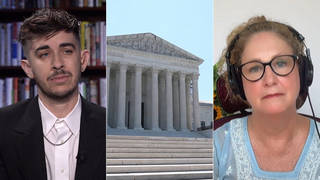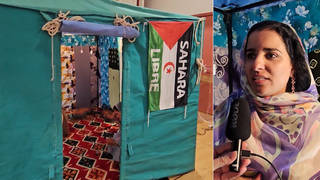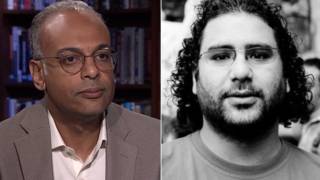
Topics
Egyptian President Hosni Mubarak refused to step down tonight, despite early reports that he would announce his resignation. Democracy Now! senior producer Sharif Abdel Kouddous reports from Tahrir Square. “The glue that holds us together is the demand for Mubarak to step down,” he says.
AMY GOODMAN: Mubarak just gave his speech. Suleiman just gave his speech. Tell us the reaction in Tahrir.
SHARIF ABDEL KOUDDOUS: The crowd was jubilant here in Tahrir for many hours leading up to Mubarak’s speech. When he started speaking, there was — a hush fell over the entire crowd here in Tahrir Square. You could hear nothing else but Mubarak’s voice crackling over the loudspeakers, people hunched together to listen to radios and headsets to try and catch word of what the President was saying.
Then, when it was clear he wasn’t leaving, we heard sporadic shouts of ”Ad-dhab! Leave!” People started yelling. And then, when the speech ended, many hundreds took off one shoe and held it in the air in an act of defiance and disgust at the President’s speech. And then, soon after that, the raw emotion just poured forth here in Tahrir Square. Some people began crying. Many began yelling. Many started up the chant of this uprising, which is, “The people demand the fall of the regime.”
We’ve spoken to many here. There was debate about whether to march out of the square, whether to march to the presidential palace, whether to march to the TV state building, which is not far here from Tahrir. Many are calling for calm and to remain peaceful, which it seems that is the case right now. But utter, utter disappointment that switched very quickly from jubilation, when there was electricity in the air. People thought that tonight was the night. And tonight is not the night.
And people are determined to come out in just vast numbers tomorrow, not just to fill the streets of Tahrir or fill the square, but to fill the streets of Cairo, to take over certain parts of Cairo, Ramses Square, other parts, the parliament building, and to really make their voices heard again and again. Until Mubarak leaves, they are not — they are not stepping down. They are determined to stay here until he does.
AMY GOODMAN: How many people are there in Tahrir Square? Is this the largest mass, even before tomorrow’s even larger demonstrations expected?
SHARIF ABDEL KOUDDOUS: Amy, as you know, on the ground here, it’s very hard to tell numbers. Let me just say that just a couple of hours before, it was harder to move around any part of Tahrir than it has been since I’ve been here. It was literally shoulder to shoulder. And that happens sometimes in rallying areas of the crowd, but this was almost in the entire square.
Tomorrow I think we’re going to see numbers that we have not seen before. This has not quelled anything. This is only going to make people come out in stronger and bigger numbers. And tomorrow, I think, will really shake the ground of Egypt.
AMY GOODMAN: Do you know — can you describe for us who is in Tahrir? Give us a sense of the people, the cross section that is there.
SHARIF ABDEL KOUDDOUS: Amy, it’s the cross section that has been here throughout this uprising. There’s men. There’s women. There’s young. There’s old. There’s babies. There’s Christians. There’s Muslims. There’s people from all walks of life here. There’s activist community. There’s the Muslim Brotherhood. There’s peasant farmers from Upper Egypt, the saida. There’s doctors. There’s lawyers. There’s journalists. There’s just every type of Egyptian here speaking with one voice. The glue that holds us together is the demand for Mubarak step down. That glue has only become stronger, bringing people together the more he does not listen to the people, to what he calls his [inaudible]. They are telling him to step down, and he is not listening. And the crowd — you can hear them behind me — are getting more and more riled up and saying — they’re demanding that Mubarak leave. And I just want to stress — I don’t know what the reports are of any kind of chaos or anything, but this is a controlled anger, and it’s a controlled response. People here are debating what to do. It’s not chaotic by any means.
AMY GOODMAN: Omar Suleiman, the Vice President, former head of military intelligence, said you should watch out for foreign satellite — you shouldn’t be watching foreign satellite, because the emphasis here is “We are not going to give in to foreign powers.” He said something like this just before journalists were attacked, as well.
SHARIF ABDEL KOUDDOUS: Well, I mean, that is a tactic of the regime, trying to foment chaos and pretend that this uprising is something that has been created from without. But it has been very much been a popular uprising, a grassroots uprising, something that came from the streets of Cairo. I think what he said is a veiled threat and — well, maybe not so veiled. But that is typical of this regime. They’ve tried many tactics to try and stem this flood of people that is demanding Mubarak to leave, and every tactic that they try only brings out more and more people. And, you know, Mubarak also said he paid condolences to the 15 people who died. People here are — one man started crying and said there were more than 300 and that these martyrs will not be forgotten, that their blood is around his neck. And so, people are very, very disappointed in Mubarak’s speech. One woman told me, “I don’t know why I was optimistic, because he just keeps disappointing me again and again.” But they remain resolute here in wanting to keep filling the streets and calling for Mubarak to step down.
AMY GOODMAN: Sharif, are you concerned about the military? I mean, Mubarak and Suleiman run the military. What will be their role right now, as they talk about preventing chaos?
SHARIF ABDEL KOUDDOUS: Well, there was talk earlier, as well, that the military had met without Mubarak and Suleiman and had met alone and were going to — you know, a chief, a general came up and spoke on the stage here earlier this afternoon and said that they were going to meet the people’s demands. That caused a lot of jubilation here and [inaudible] the expectation that Mubarak was going to step down. So, people here are still unafraid of the military. I think they think they won’t harm them — this, despite the fact that the military has jailed hundreds, if not thousands, of activists, and there’s been allegations of torture, as well. But no one — I mean, one thing I can say is that there is no fear here. There is no — the people are not afraid of what might come. They only wanted to — wanted Mubarak to step down. But their boldness and their courage and their steadfastness is very, very clear, from the youngest child to the oldest person here. They remain very confident that they’re still going to win, but they’re just disappointed that it’s taking so long.
AMY GOODMAN: It’s after midnight. Are people leaving?
SHARIF ABDEL KOUDDOUS: It’s hard to tell. It’s still very, very packed. I think some people have left, looking to come back tomorrow in great, great numbers. But this is as full as I’ve ever seen it at this hour. It is absolutely packed still. And we’ll wait to see if people are going to spend the night here and just begin rallying as soon as light breaks tomorrow, or people will go home. Well, what is clear is that after the noon prayer tomorrow, Cairo is going to be filled with people, the likes of which I don’t think we’ve seen ever before.












Media Options